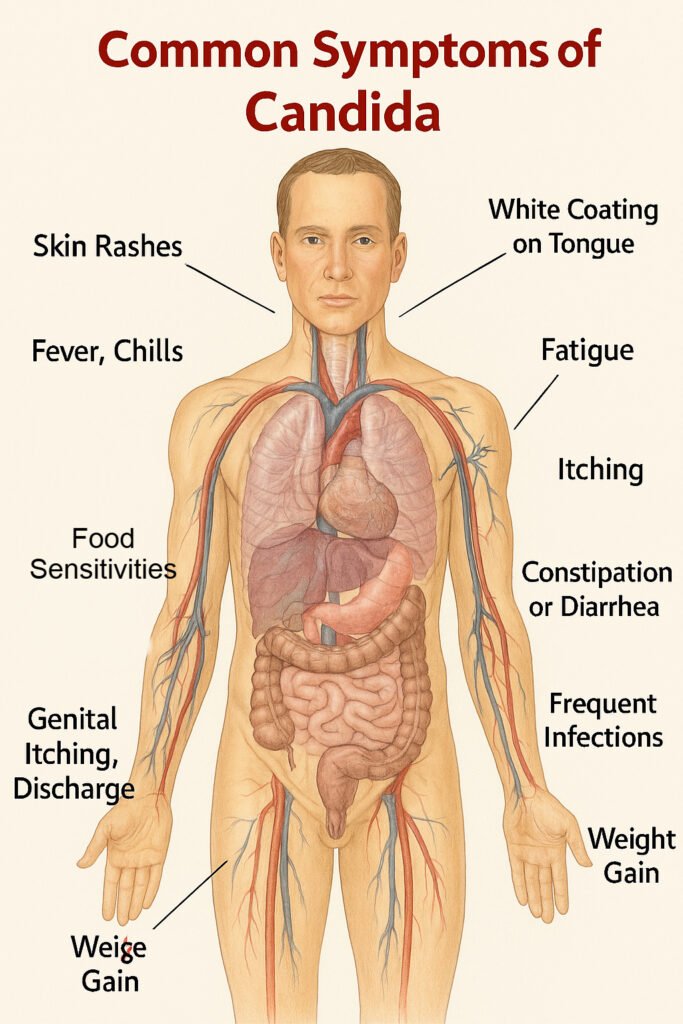Candida
What is Candida?
Candida is a yeast fungus that is found in the body’s normal flora and does not cause disease under normal conditions. It is found in the intestines, mouth, and in women, the vagina. When the intestinal flora is disrupted and the immune system is weakened, candida multiplies and changes from a single-celled form to a multicellular form, turning into an invasive and disease-causing form. They cause damage to the intestinal lining, causing many clinical symptoms.

What are the symptoms?
- Excessive desire to eat sweets, getting hungry quickly, shaking hands when hungry, sweating, obesity, inability to lose weight, alcohol smell in the mouth even though no alcohol is consumed
- Constipation, diarrhea, itching in the anus, excessive gas, indigestion, bloating
- Canker sores in the mouth, white coatings on the gums and tongue, bad breath
- Chronic fatigue, sleep disorders, depression, anxiety, difficulty concentrating
- Chronic widespread pain, migraine, muscle contractions, swelling and pain in the joints
- Urinary tract complaints, vaginal infections in women, painful menstruations, hormonal imbalance, prostate inflammation in men, impotence
- Allergic skin rashes, eczema, allergic rhinitis, burning eyes
Why does it happen?
Candida cannot exist unless the intestinal flora is disrupted and the immune system is weakened. Any factor that disrupts the intestinal flora prepares the ground for candida.
- Antibiotics, anti-rheumatic drugs, hormones, cortisones
- Unhealthy diet: Excessive carbohydrates, sugar, refined products, alcohol
- Poor quality sleep, lack of exercise, stress, drinking little water
- Previous surgeries, especially in the abdominal area
- Poor oral and dental health
- Weakening of the immune system due to other diseases
- How is it diagnosed?
- In patients who eat too much sweets, have sugar crises, cannot lose weight, have shaking hands and feet when hungry, have constipation, diarrhea, itching in the anus, white lesions in the mouth, chronic fatigue, sleep problems, depression, if routine laboratory findings are normal, candida should be considered. High levels of candida in stool analysis and high levels of IgA in the blood are instructive. More practically, diagnosis can be made with kinesiological muscle testing and bioresonance.
How is it treated?
Trying to treat with antifungal drugs will only disrupt the body’s balance even further. The most important treatment method is to completely eliminate refined carbohydrates and sugar, which are the main nutrients of Candida, from the diet for at least 2 months. Alcohol should also be strictly prohibited as it quickly turns into sugar in the intestines. Other sugar sources are fructose, which is abundant in ripe and dried fruits, and this group of foods should not be eaten for 2 months. Rice, bulgur, vinegar, soy sauce and yeast foods are also foods that should be avoided. The foods that should be consumed the most during the diet are green leafy vegetables and tomatoes. Nuts, legumes and seeds are beneficial in terms of protein content and fiber. Whole grains, corn flour, lean white and red meat can also be consumed easily.
It is very important to implement the diet without any irregularities and strictly. Any irregularities in the diet will only prolong the treatment process.
In addition to the diet, probiotics, vitamin and mineral support and acidosis should be taken.
It can be very difficult for these patients to adapt to the diet due to sugar cravings. In this case, bioresonance is very helpful. The removal of sugar frequencies from the body makes compliance with the diet very comfortable. It also provides the body’s energy balance. The patient’s anxiety and depression complaints can be relieved with Bach flowers.
Neural therapy is essential for providing intestinal balance, increasing blood flow and lymphatic drainage, and removing the effects of disruptive areas such as surgical scars that disrupt intestinal health.
Ozone gas given to the intestines rectally is very beneficial for repairing the intestinal lining and eliminating inflammation in the intestine. A minimum of 10 sessions should be applied.
For complete recovery, the combined application of the methods listed should be done and old habits should not be returned to after recovery.
Frequently Asked Questions
Do you have any other questions?
We created this section so you can quickly find the information you need. Finding answers to your questions is very easy. If you need more detailed information, you can use the contact form.